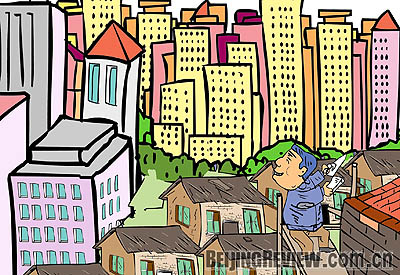|

Informal Settlements are ok in China's big cities. That's the opinion of Qin Hui, a professor of history at China's prestigious Tsinghua University. Speaking at a recent public forum on urbanization in Shenzhen City, south China's Guangdong Province, Qin said, "By building these areas, big cities could show more consideration for low-income residents, and provide them with more welfare." He believes that cities with informal settlements built on government-owned land as part of their infrastructure will never appear inferior to other cities, but, instead, this shows respect for the freedom of migrant workers to reside in urban areas.
It's a sad fact that tens of millions of migrant workers who have spent years in big cities find it impossible to live permanently in their second hometown. Furthermore, because of the hukou (official permit to reside in a locality permanently) obstacle and the shortage of welfare-oriented houses in cities, migrant workers can never expect to benefit from any of the social welfare offered in built-up urban areas. Qin advocates that the least cities could do is to ensure that migrants have the freedom to build informal settlements in designated city areas. He is not suggesting duplicating the shanty towns found in some other countries, but rather a kind of low-class and affordable residential area for meager-income earners, in essence a form of welfare. This will differ from other informal settlements around the world as these are usually built on land that the occupants have no legal claim to, or occupy illegally. In China, the suggestion is that the government designates land for these informal settlements.
However, opponents to Qin's proposal believe that informal settlements are breeding areas for crimes. If the poor and disadvantaged are all put in the same area to live in the most basic conditions, it is certain that more social problems and conflicts will occur and the gap between the rich and the poor will expand, they say. In addition, while informal settlements provide cheap shelter for migrant workers, it will also strengthen urban residents' discrimination against them. Another factor is that workers do not need to travel home to the countryside if they call their city shack home, and as a result employers may decide to no longer pay migrants traveling allowances.
Social progress
Qu Fangye (Qilu Evening News): Modernization in some sense is also a process of urbanization. Modern cities are attractive to migrants because these places offer opportunities. Nowadays, rural areas have too much surplus labor driving the exodus to cities.
However, in the current situation, it seems impossible for migrant workers to put down roots in cities and after years of work they have to return to the countryside. This undoubtedly goes against the global trend of urbanization.
How to help migrant workers permanently stay in cities is a big challenge. Presently, it's still impossible to provide houses for everyone who migrates to cities, and low-rent houses and economically affordable houses are preserved for indigenous city dwellers. Under this circumstance, Qin's suggestion to build informal settlements in marginal areas of cities is practical and reasonable.
If migrant workers are provided with stable shelter, they can also move their families to cities, initially solving the age-old problem of farmer-turned-workers living apart from their families. It would be a goodwill measure by the government, rather than a discriminatory policy. Many developed countries have experienced this social problem, so why can't we bravely face this reality and give legal status to informal settlements?
Of course, with economic development, informal settlements will eventually disappear. However, at this stage, helping migrant workers get integrated into the urban life is an important part of urbanization and modernization and this proposal is a symbol of social progress.
Ou Muhua (www.scol.com.cn): One thing must be clarified: This proposal does not necessarily mean migrant workers are confined to live in these informal settlement areas. Qin's suggestion actually means that migrant workers should be provided with an area where their rights can be better protected, but at the same time they still have the freedom to stay in any part of the city.
Some city dwellers may feel it unfair to grant farmer-turned-workers a designated area, but subconsciously they believe that as urban residents they are superior to farmers and they accept the barrier resulting from hukou. In accordance with international practice, if a migrant worker has worked and lived in a city for five years, he or she should be granted equal treatment with other city residents.
Professor Qin's suggestion is a supplement to current urban housing policies. The low-income group among urban residents has already been covered by all kinds of welfare systems, and although some still have no access to such welfare, their rights in this regard are already protected. However, migrant workers enjoy almost none of the various welfare benefits.
Perhaps these designated areas should not be referred to as slums or shanty towns as this would make migrant workers feel shameful and disgraced.
Shu Shengxiang (hlj.rednet.cn): To offer low-income earners, including migrant workers, the chance to build their own shelter is actually providing them with the lowest level of freedom. If cities would not offer farmers more housing-related welfare, they at least should stop blocking them from living there. It's true that city governments are obliged to offer housing welfare to local dwellers, but it does not mean that when the welfare is unable to cover all urban residents, migrant workers' freedom to live in cities should not be protected.
| 